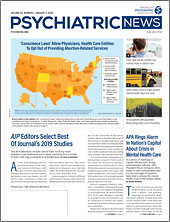More students are seeking mental health care on college campuses today—a wave experts say is driven in part by societal changes.
Between fall 2009 and spring 2015, the use of college and university counseling centers increased by an average of 30% to 40%, while enrollment increased by only 5%, according to the 2018 annual report of the Center for Collegiate Mental Health (CCMH) at Pennsylvania State University. CCMH summarizes reports on counseling centers usage from about 550 university and college counseling centers.
Anxiety, depression, and relationship problems are the most commonly reported concerns of the students seeking care, the report noted.
“The reasons they show up at counseling services haven’t changed much,” Sharon Mitchell, Ph.D., president of the Association for University and College Counseling Center Directors and director of counseling services at the University at Buffalo, told Psychiatric News. “But students [today] have an increased level of distress when they come in and it’s more disruptive to their lives.”
“We’re victims of our own success,” added Ludmila De Faria, M.D., a clinical assistant professor of psychiatry at Florida State University College of Medicine in Tallahassee and co-chair of APA’s Caucus on College Mental Health. Adolescents with psychiatric disorders who have responded to treatment at home find new stresses presented by unfamiliar campus life, which can trigger new or the recurrence of symptoms.
Individualized Education Plans are commonly used to help ensure that K-12 students with a mental disorder receive specialized instruction and other services. However, once in college, students must advocate for themselves to get extended test times or other accommodations for their conditions, she said.
In an age of “helicopter” or “snowplow” parents, many college students appear less able to manage their own affairs, Mitchell said. “They’ve spent more time with their parents and may turn to them for advice, but mom and dad have not helped them learn how to try and fail and make decisions on their own.”
Some universities hire case managers who can work with students, reminding them to go to appointments or running interference with professors.
Students today are also up against a false sense of the perfection of their peers, as is often portrayed in social media, Mitchell said. “They think everyone else is OK but not them.”
Suicidality is another concern for counseling services. According to CCMH, “The self-reported lifetime prevalence rates of ‘threat-to-self’ characteristics (nonsuicidal self-injury, 27.8%; serious suicidal ideation, 35.8%; and suicide attempts, 10.3%) increased for the eighth year in a row among students receiving counseling services.” In addition to conventional services, managing that risk now means training everyone from campus police to professors to residential advisors to recognize early symptoms.
College Counseling Services Respond
In response to some of these challenges, college counseling services have adapted. Florida State, for example, has not only added extra counselors but has placed them inside campus primary care clinics, said De Faria. As a result, students can be ushered down the hall into the mental health offices without waiting for a later appointment. The system helps to connect more minorities and male students—both of whom tend to shy away from regular mental health clinics because of stigma—with services, she said.
International students present other challenges. Clinics may need to hire people who speak their language and can translate both words and cultural concepts.
More broadly, college counseling centers also are looking at new and innovative ways to reach students who may know little about mental health services, said Meera Menon, M.D., a psychiatrist at Ohio State University’s Counseling and Consultation Service, and co-chair of APA’s Caucus on College Mental Health. Outreach programs offered in classrooms or at club meetings can educate students on how to recognize symptoms of mental illness, seek care, and support friends with mental illness. “Meeting students where they are can really reduce barriers for seeking out treatment,” she said.
Treatment Models Vary From Campus to Campus
Even as college counseling centers look for new ways to engage students in seeking mental health services, these centers are struggling with how best to meet the growing demand for services.
“Years of constantly rising demand lead to longer and longer wait times and a growing pressure to ‘do something’ so students can access services more quickly,” said the CCMH annual report.
Clinics are caught between two approaches to taking on new patients, neither of which is fully satisfactory. On one hand, centers can simply absorb new patients into the clinicians’ existing caseload, even if that results in longer times between visits and less time in treatment per person. On the other hand, the so-called “treatment model” mandates that a student must delay seeing a counselor until a time slot opens. The real solution, said the CCMH report, is to hire additional staff personnel to cope with the added demand, although that requires additional resources.
Whether a college or university is public or private, large or small is less important than the resources available at the institution and how the administration values mental health services, said Mitchell. “There’s no one model for all. Each campus has to figure out what it needs.” ■
“The 2018 annual report of the Center for Collegiate Mental Health is posted
here.

